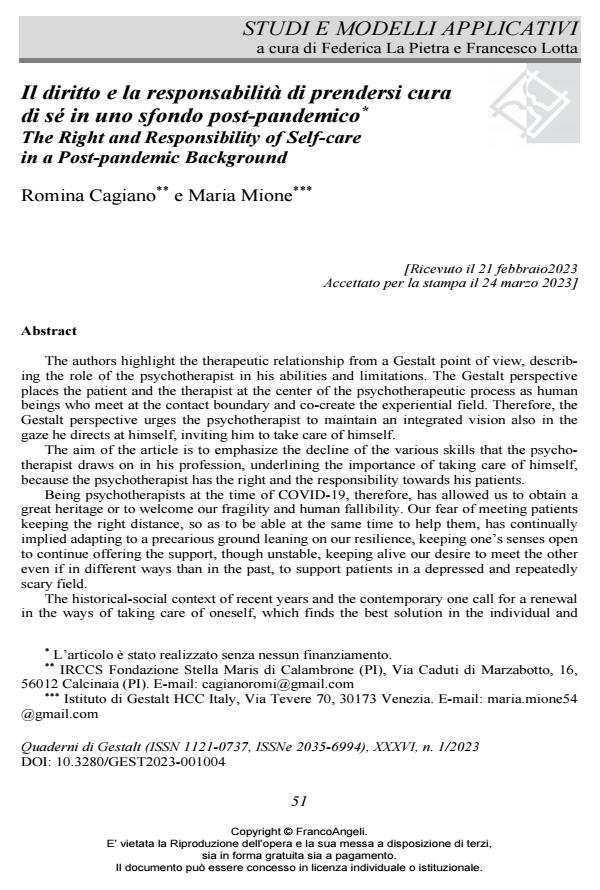The Right and Responsibility of Self-care. in a Post-pandemic Background
Journal title QUADERNI DI GESTALT
Author/s Romina Cagiano, Maria Mione
Publishing Year 2023 Issue 2023/1
Language Italian Pages 10 P. 51-60 File size 164 KB
DOI 10.3280/GEST2023-001004
DOI is like a bar code for intellectual property: to have more infomation
click here
Below, you can see the article first page
If you want to buy this article in PDF format, you can do it, following the instructions to buy download credits

FrancoAngeli is member of Publishers International Linking Association, Inc (PILA), a not-for-profit association which run the CrossRef service enabling links to and from online scholarly content.
The authors highlight the therapeutic relationship from a Gestalt point of view, describing the role of the psychotherapist in his abilities and limitations. The Gestalt perspective places the patient and the therapist at the center of the psychotherapeutic process as human beings who meet at the contact boundary and co-create the experiential field. Therefore, the Gestalt perspective urges the psychotherapist to maintain an integrated vision also in the gaze he di-rects at himself, inviting him to take care of himself. The aim of the article is to emphasize the decline of the various skills that the psychothera-pist draws on in his profession, underlining the importance of taking care of himself, because the psychotherapist has the right and the responsibility towards his patients. Being psychotherapists at the time of COVID-19, therefore, has allowed us to obtain a great heritage or to welcome our fragility and human fallibility. Our fear of meeting patients keeping the right distance, so as to be able at the same time to help them, has continually im-plied adapting to a precarious ground leaning on our resilience, keeping one’s senses open to continue offering the support, though unstable, keeping alive our desire to meet the other even if in different ways than in the past, to support patients in a depressed and repeatedly scary field. The historical-social context of recent years and the contemporary one call for a renewal in the ways of taking care of oneself, which finds the best solution in the individual and group supervision and in the personal psychotherapy. These spaces are a common background from which figures emerge in a process of constant co-construction and which, for this reason, be-come a place of meeting, dialogue, learning and transformation for the single psychotherapist.
Keywords: Self-care, contact boundary, supervisory group, psychotherapist skills, being falli-ble.
Romina Cagiano, Maria Mione, Il diritto e la responsabilità di prendersi cura di sé in uno sfondo post-pandemico in "QUADERNI DI GESTALT" 1/2023, pp 51-60, DOI: 10.3280/GEST2023-001004